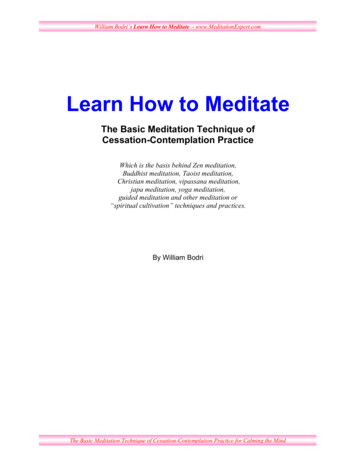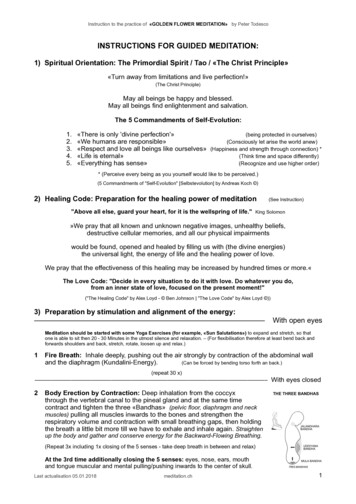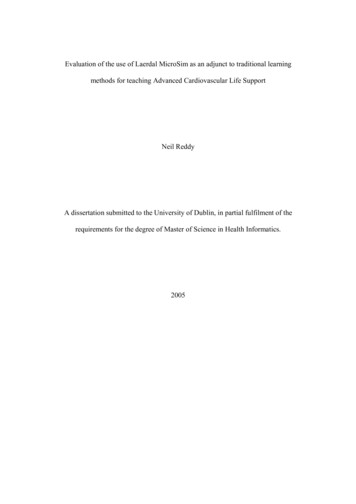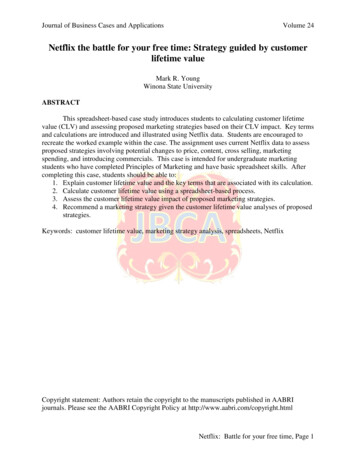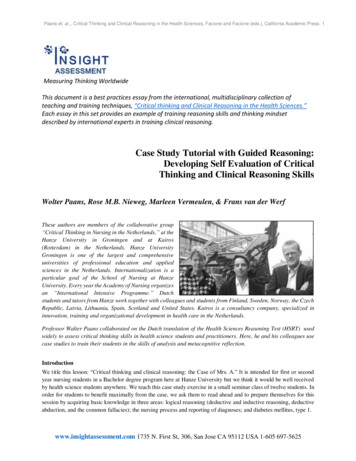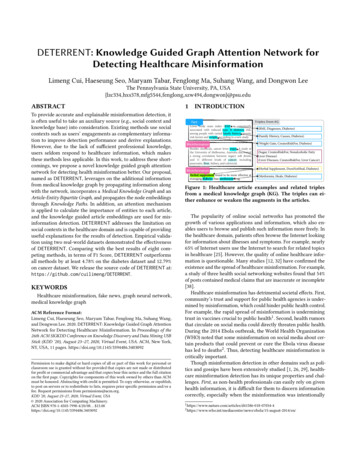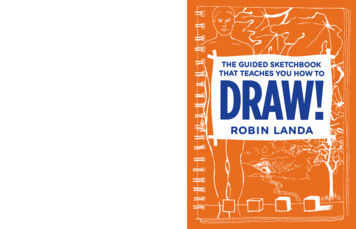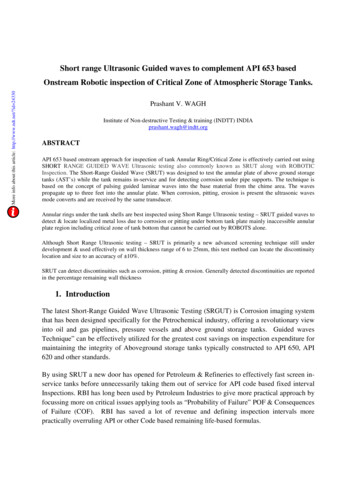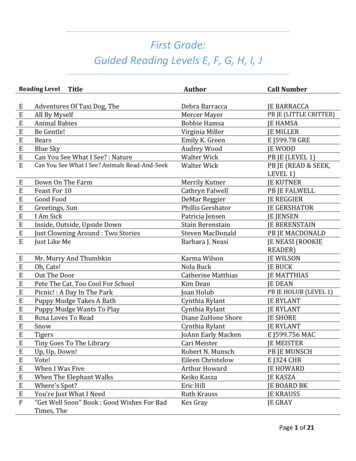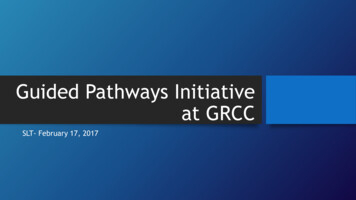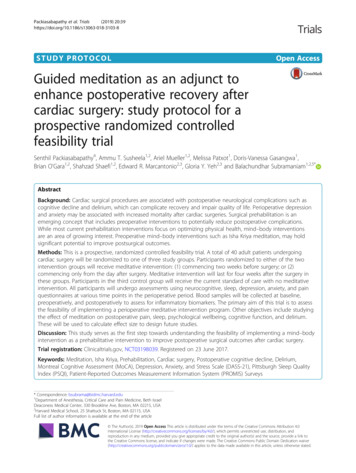
Transcription
Packiasabapathy et al. Trials(2019) Y PROTOCOLOpen AccessGuided meditation as an adjunct toenhance postoperative recovery aftercardiac surgery: study protocol for aprospective randomized controlledfeasibility trialSenthil Packiasabapathy4, Ammu T. Susheela1,2, Ariel Mueller1,2, Melissa Patxot1, Doris-Vanessa Gasangwa1,Brian O’Gara1,2, Shahzad Shaefi1,2, Edward R. Marcantonio2,3, Gloria Y. Yeh2,3 and Balachundhar Subramaniam1,2,5*AbstractBackground: Cardiac surgical procedures are associated with postoperative neurological complications such ascognitive decline and delirium, which can complicate recovery and impair quality of life. Perioperative depressionand anxiety may be associated with increased mortality after cardiac surgeries. Surgical prehabilitation is anemerging concept that includes preoperative interventions to potentially reduce postoperative complications.While most current prehabilitation interventions focus on optimizing physical health, mind–body interventionsare an area of growing interest. Preoperative mind–body interventions such as Isha Kriya meditation, may holdsignificant potential to improve postsurgical outcomes.Methods: This is a prospective, randomized controlled feasibility trial. A total of 40 adult patients undergoingcardiac surgery will be randomized to one of three study groups. Participants randomized to either of the twointervention groups will receive meditative intervention: (1) commencing two weeks before surgery; or (2)commencing only from the day after surgery. Meditative intervention will last for four weeks after the surgery inthese groups. Participants in the third control group will receive the current standard of care with no meditativeintervention. All participants will undergo assessments using neurocognitive, sleep, depression, anxiety, and painquestionnaires at various time points in the perioperative period. Blood samples will be collected at baseline,preoperatively, and postoperatively to assess for inflammatory biomarkers. The primary aim of this trial is to assessthe feasibility of implementing a perioperative meditative intervention program. Other objectives include studyingthe effect of meditation on postoperative pain, sleep, psychological wellbeing, cognitive function, and delirium.These will be used to calculate effect size to design future studies.Discussion: This study serves as the first step towards understanding the feasibility of implementing a mind–bodyintervention as a prehabilitative intervention to improve postoperative surgical outcomes after cardiac surgery.Trial registration: Clinicaltrials.gov, NCT03198039. Registered on 23 June 2017.Keywords: Meditation, Isha Kriya, Prehabilitation, Cardiac surgery, Postoperative cognitive decline, Delirium,Montreal Cognitive Assessment (MoCA), Depression, Anxiety, and Stress Scale (DASS-21), Pittsburgh Sleep QualityIndex (PSQI), Patient-Reported Outcomes Measurement Information System (PROMIS) Surveys* Correspondence: bsubrama@bidmc.harvard.edu1Department of Anesthesia, Critical Care and Pain Medicine, Beth IsraelDeaconess Medical Center, 330 Brookline Ave, Boston, MA 02215, USA2Harvard Medical School, 25 Shattuck St, Boston, MA 02115, USAFull list of author information is available at the end of the article The Author(s). 2019 Open Access This article is distributed under the terms of the Creative Commons Attribution 4.0International License (http://creativecommons.org/licenses/by/4.0/), which permits unrestricted use, distribution, andreproduction in any medium, provided you give appropriate credit to the original author(s) and the source, provide a link tothe Creative Commons license, and indicate if changes were made. The Creative Commons Public Domain Dedication o/1.0/) applies to the data made available in this article, unless otherwise stated.
Packiasabapathy et al. Trials(2019) 20:39BackgroundHospital admissions and surgeries have been increasingwith time due to a shifting pattern of disease prevalencefrom infectious diseases to lifestyle disorders [1]. Cardiovascular diseases are increasingly seen in the elderly withvarious co-morbidities such as hypertension, diabetes,and renal impairment; they often require surgery [2]. Patients who undergo cardiac surgery can have significantpain, sleep impairment [3, 4], postoperative delirium(POD), and cognitive decline (POCD) [5], which canlead to increased length of hospital stay and increasedhealthcare expenses. Postoperative pain and sleep impairment can have a direct impact on postoperative delirium and cognitive recovery and the complications canbe long lasting which can negatively impact the qualityof life [6]. Evidence suggests that non-surgical preoperative patient factors such as psychological characteristics,personality traits, and preoperative cognitive impairmentmay also play a significant role in surgical recovery andpatient satisfaction [7, 8]. Anxiety and depression in theperioperative period have been associated with increasedmortality after cardiac surgery [9]. Thus, there is adefinitive role for mind–body prehabilitative interventions to improve postoperative outcomes.Surgical prehabilitation is an emerging concept that refers to interventions in the preoperative period aimed atimproving postsurgical outcomes. These are pre-emptivestrategies including physical therapies, pharmacological,and non-pharmacological measures to improve outcomes.In their review, Culley et al. mentioned that surgery canbe compared to a fire and prehabilitation as a fire retardant [10]. Mind–body interventions include a wide rangeof practices and therapies that positively impact the mind’sinfluence on physical health [11]. Mind–body interventions have been shown to promote sleep and reducepostoperative delirium [10, 12, 13]. Integrative cardiacwellness programs can have a positive impact and canpromote patient’s innate ability to heal [14].In an expanded systematic review, it was reported thatrelaxation interventions and hypnosis could have a positive influence on psychological wellbeing [15]. Only twostudies included in the expanded systematic review wereof high quality [16, 17]. Most of the other studies didnot have randomization or blinding of the outcomeassessors, leading to inconclusive results. Lack of reporting pain scores was a significant limitation of the studies.Another systematic review of randomized controlledtrials examining relaxation for acute pain managementsimilarly concluded that though there was “some weakevidence” to support the use of these therapies, the datawere inconclusive, in part owing to methodological limitation [18]. The mind–body intervention was used onlyone day before surgery in most of the studies includedin the meta-analysis. Another review provides evidencePage 2 of 8supporting the efficacy of mind–body interventions fordepression, anxiety, and stress [19].A recent study done by Kiran et al. explored the roleof Rajyoga meditation, a certain type of meditation forthe modulation of anxiety and serum cortisol in patientsundergoing coronary artery bypass surgery. This studyshowed that the addition of meditation helped patientsin coping with stress and they found a significant declinein anxiety levels in the postoperative period. They alsofound a favorable modulation of serum cortisol levelswith the meditation [12]. The above studies demonstratethat breathing and meditative techniques have a biological plausibility to favorably impact outcomes. Theyhave been shown to have established use in non-surgicalchronic disease states such as fibromyalgia, cancer,hypertension, and psoriasis [20].Finding a meditation technique that has the optimalcomponents and that is easy enough to ensure compliance is a challenge. Meditation encompasses a family ofdifferent systems and practices including yoga meditation, mantra meditation, tai chi, mindfulness meditation,etc. Isha Kriya (IK) is a form of guided meditation thatinvolves thought, focus, and mindful slow breathing.This regimen was chosen because it excels in simplicityand is suitable to introduce meditation to beginners.Regarding timing and duration of application of theseprehabilitative measures, research groups have studiedinterventions of durations in the range of 1–30 daysbefore surgery [21, 22]. In earlier studies that examinedpsychosocial support, a duration as short as one day before surgery was used for intervention [18]. In preoperative exercise therapies, a 3–4-week period was used.Although optimal duration is not clearly defined, basedon the current scheduling practices for surgery, twoweeks is a reasonable preoperative timeframe to investigate. This randomized, controlled pilot trial will examinethe feasibility of implementing a prehabilitative meditation program in the perioperative period.Methods / designStudy registrationThis study protocol was approved by the Committee onClinical Investigations Institutional Review Board (IRB)at Beth Israel Deaconess Medical Center (Protocol2017P000239). This trial was registered with the U.S.National Institutes of Health on clinicaltrials.gov withthe trial identification number NCT03198039 on 23 June2017. The trial is currently ongoing and recruiting.Study designThis study is a prospective, randomized, controlled,assessor blinded, single-center trial with three arms,including two experimental arms and one control arm.The study population will include adult patients
Packiasabapathy et al. Trials(2019) 20:39undergoing coronary artery bypass grafting (CABG),valve surgeries, and/or aortic surgery at Beth Israel Deaconess Medical Center, a tertiary care hospital. Informedconsent will be obtained before initiation of study procedures. Further, all trial conduct and reporting will be inaccordance with components as described in the SPIRIT(Standard Protocol Items: Recommendations for Interventional Trials) checklist [23, 24].Aims and objectivesWe hypothesized that it is feasible to implement a meditation program aimed at improving outcomes in theadult cardiac surgical population. The primary aim ofthis pilot study is to assess the feasibility of implementing a meditation program in the preoperative period,which will be measured in terms of adherence of theparticipants to the meditative regimen. Our study willfurther explore whether a perioperative meditation regimen can result in improvement in postoperative outcomes including pain, sleep, psychological wellbeing,cognitive function, and delirium. Given the pilot natureof the proposed trial, all secondary outcomes will beconsidered hypothesis generating only.Eligibility criteriaPatients aged 18 years, undergoing CABG, valve surgery,or isolated aortic surgery will be included in the study. Toallow implementation of a prehabilitative strategy, surgeries must be scheduled at least 14 days after enrollment(Table 1).Patients undergoing urgent or emergent procedures orthose undergoing only minimally invasive cardiac procedures will be excluded. Non-English-speaking patients andthose with significant visual impairment will also be excluded, as these factors preclude performing neurocognitive assessments. Patients who do not have high-schoollevel or the equivalent educational attainment, patientswith moderate to severe cognitive impairment as definedby baseline Montreal Cognitive Assessment (MoCA) 10and those on cognition-enhancing drugs will be excluded.Patients with a history of cognitive impairment andpsychiatric illnesses will be excluded. Patients who areactively taking pain medications will be excluded. Patientswho are currently enrolled in another interventional studythat could potentially impact the primary outcome willalso be excluded from the study.Recruitment and randomizationIndividuals will be identified from perioperative surgicalconsult lists and cardiac surgery clinic visit schedules. Ifa candidate is eligible for enrollment, he or she will beapproached by a member of the research team to discussthe study in detail. Written informed consent will beobtained before initiation of any study procedures.Page 3 of 8Table 1 Study inclusion and exclusion criteriaInclusion criteria1. Aged 18 years2. Undergoing any of the following types of cardiac surgery: CABGwith or without valve surgery (aortic and/or mitral); isolated valvesurgery; isolated aortic surgery3. Surgery scheduled for at least 14 days after enrollmentExclusion criteria1. Urgent and/or emergent surgery2. Non-English speaking3. Pre-existing history of psychiatric illness as documented in themedical record or divulged in history taking in pre-enrollment patientinterview, such as anxiety, depression, or bipolar disorder4. History of cerebrovascular accident or recent history ( 3 months)of seizures5. History of dementia, Parkinson’s disease, Alzheimer’s disease, orother forms of cognitive decline6. Current use of cognition-enhancing drugs7. Current management for chronic pain8. Currently enrolled in another interventional study that couldimpact the primary outcome, as determined by the PI9. Educational attainment below high school level or equivalent10. Significant visual impairmentPreoperative dropout criteria1. Cognitive impairment as defined by MoCA score 102. DASS-21 depression score 10After obtaining consent, enrolled participants will berandomly assigned to one of three groups using blockrandomization in a 1:1:1 allocation. REDCap will beutilized to implement the randomization schema whilemaintaining the blind. REDCap is a secure softwaredesigned for rapid data capture tools using metadatatable referenced by presentation-level operational modules [24]. Patients will be randomized to one of thefollowing groups: Group 1: Patients are asked to meditate twice daily,starting from least two weeks before surgery, upuntil four weeks after surgery; Group 2: Patients are asked to meditate twice dailyfrom the day after surgery until four weeks afters
etc. Isha Kriya (IK) is a form of guided meditation that involves thought, focus, and mindful slow breathing. This regimen was chosen because it excels in simplicity and is suitable to introduce meditation to beginners. Regarding timing and duration of application of these prehabilitative measures, research groups have studied interventions of durations in the range of 1–30 days before .
